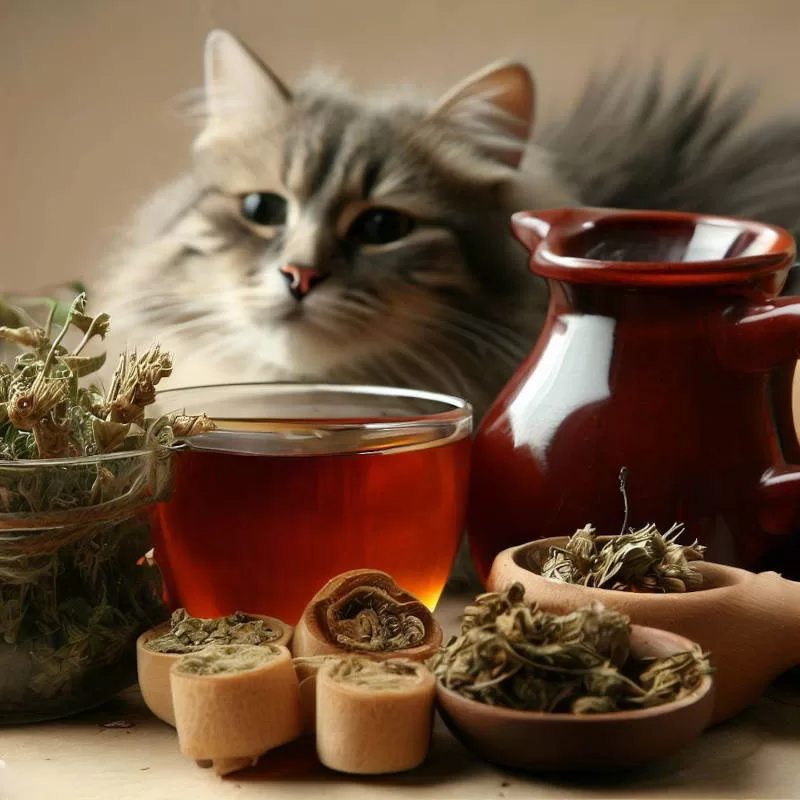“Tea is the key to health, happiness and wisdom.” – Eisaku Sato. This proverb can also be applied to our feline friends. Exploring the use of herbs in cat health is nothing new. Since time immemorial, medicinal teas have been used to improve the well-being of our pets. However, before starting to prepare a hot cup of green tea for your cat, remember that it is important to consult a veterinarian.
Do not confuse medicinal teas with ordinary foods! Despite the beneficial properties of these drinks, not all herbs are safe for cats. Therefore, always inform yourself about the differences between these two types of food before introducing anything new to your pet’s diet.
Identifying Safe Herbs for Cats
List of Safe Herbs
Cats are known to be curious animals and that includes exploring plants. Some herbs may be beneficial for them, such as:
- Catnip (Nepeta cataria)
- Valerian (Valeriana officinalis)
- Chamomile (Matricaria recutita)
- Peppermint (Mentha piperita)
These herbs are safe and may even aid digestion, soothe stress, or stimulate play.
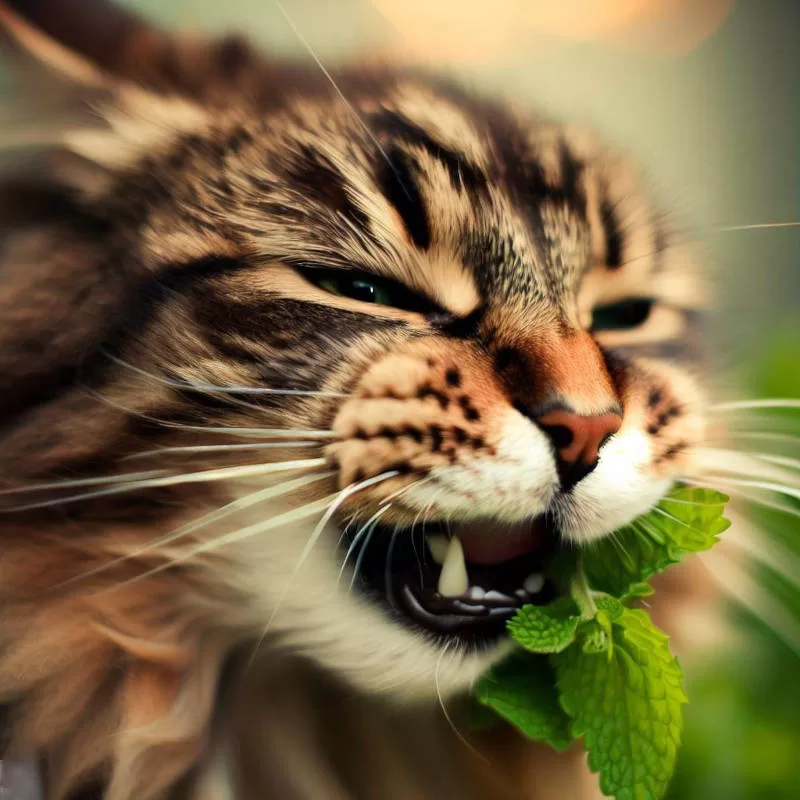
Toxic or Harmful Plants
On the other hand, some plants can be harmful or even toxic to cats. Lilies, azaleas and rhododendrons are just a few examples. It’s important to do some research before introducing a new plant into your cat’s environment.
Organic Origin of Herbs
The organic origin of the herbs used is a crucial point. Organic herbs do not contain pesticides or chemicals that could harm your cat. If possible, always opt for certified organic products.
The Role of Veterinarians
Veterinarians have a key role in identifying safe herbs. They are knowledgeable about cats’ specific needs and can provide personalized advice. Do not hesitate to consult your veterinarian before introducing new elements to your pet’s diet.
Remember: every cat is unique and may have different reactions to the same herbs. So watch carefully for any changes in your pet’s behavior after introducing a new herb.
All in all, medicinal teas for cats can be an excellent addition to your feline’s routine if used correctly. However, it is essential to ensure that the herbs are safe and come from reputable sources.
Benefits of Plants and Teas for Cats
Digestion Improvement
Medicinal teas for cats can have a positive impact on your pet’s digestion. For example, plants like chamomile are known to help soothe the digestive system, which can be especially helpful if your cat suffers from digestive issues.
Here are some plants that can improve digestion:
- Chamomile
- Pepper mint
- Fennel
Anti-inflammatory and antioxidant potential
Some herbs have anti-inflammatory and antioxidant properties. This means they can help reduce inflammation in your cat’s body and also protect cells against free radical damage.
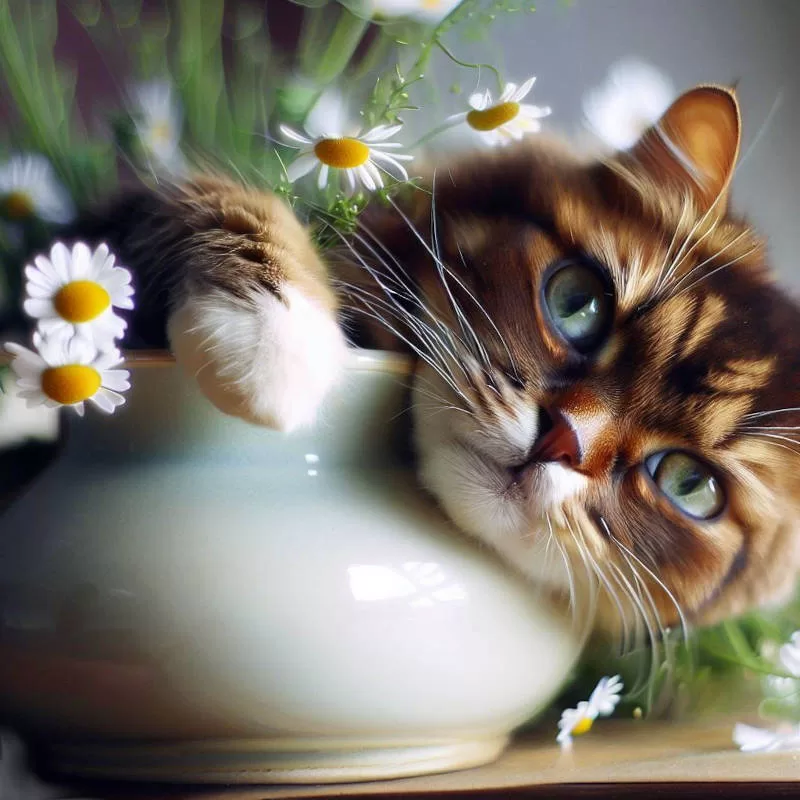
These are some plants with anti-inflammatory and antioxidant potential:
- Turmeric
- Rosemary
- Ginger
Teas as Natural Soothing
If your cat is easily stressed, some teas can help to calm him down. Plants like valerian and lemon balm are known for their calming properties.
These are examples of natural calming teas:
- Valerian
- Lemongrass
- Chamomile
Contribution to Daily Hydration
Medicinal teas not only provide health benefits, but also contribute to your cat’s daily hydration. It’s important to remember that water is a vital component of a cat’s diet, so anything that encourages fluid consumption is a win!
In short, medicinal teas offer a variety of benefits for our feline friends – from improving digestion to relieving stress. However, it is crucial to ensure that any plant or tea is safe for cats to consume before offering it to your pet.
Risks and Limits of Eating Herbs
Allergic Reactions
Cats, like any other species, can have allergic reactions to certain plants. This can happen even with medicinal teas made for them. It’s important to note that not all herbs are safe for cats to eat. Some can cause skin irritation, breathing problems or even anaphylactic shock.
- Chamomile: known for its calming properties, but it can cause allergic reactions in some cats.
- Peppermint: Although many cats like the smell, some species may have an adverse reaction to it.
Poisoning from Overuse of Herbs
Excessive or inappropriate use of herbs can lead to intoxication. For example:
- Valerian: Although often used to calm cats, overuse can lead to symptoms such as agitation and disorientation.
- Garlic: Although it is an excellent natural flea repellent, excessive consumption can cause anemia in cats.
Balance between Regular Diet and Herbal Supplementation
It’s essential to maintain a balance between your cat’s regular diet and any herbal supplements you may be considering. The diet of cats should be mainly composed of proteins from meat.
For example:
- 70% of the diet – Animal proteins
- 30% of the diet – Herbal supplements (if needed)
Always remember to consult a veterinarian before making any significant changes to your pet’s diet.
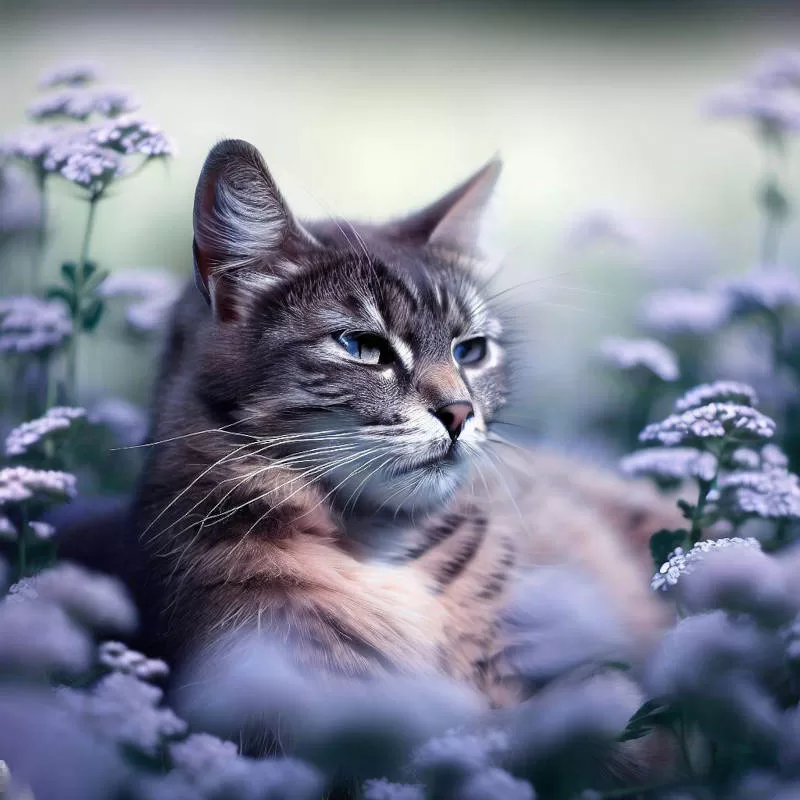
Continuous Symptom Monitoring
After consuming medicinal teas or other forms of herbal supplementation, it is crucial to continuously monitor your pet’s symptoms. Any changes in behavior or physical condition should be immediately reported to the veterinarian.
Here are some signs to look out for:
- changes in appetite
- Changes in urinary or fecal pattern
- Restless or lethargic behavior
- Vomiting or diarrhea
In short, while medicinal teas for cats can offer a number of health benefits when used correctly, there are also risks associated with their misuse or overuse. It is therefore essential to use these products with caution and always under the guidance of a qualified veterinary professional.
Preparation of Medicinal Teas for Cats
BASIC STEP BY STEP
- Start by choosing a suitable medicinal herb, such as ginger, known for its anti-inflammatory and digestive properties.
- Boil a cup of water and add about a teaspoon of your chosen herb.
- Let it steep for about ten minutes.
- Strain the tea and let it cool before offering it to your feline.
PROPER DOSAGE
The dosage of medicinal tea must be adjusted according to the weight and condition of the animal:
- Cats up to 5kg: 1/4 cup
- Cats between 5-10kg: 1/2 cup
- Cats over 10kg: 1 cup
Always remember that medicinal teas do not replace medications prescribed by the veterinarian.
CORRECT STORAGE
Prepared teas must be stored correctly to ensure freshness and effectiveness:
- Keep in the fridge in a closed container.
- Use within two days of preparation.
ALTERNATIVES TO DIRECT USE
If your cat shows resistance to drinking the tea directly, there are alternatives:
- Mix in food: A simple way is to mix a few teaspoons in the animal’s wet food.
- Add to the water: Another option is to add the tea to the cat’s water bowl, diluting the flavor a little.
At the end of this process, you will have successfully prepared a delicious and beneficial medicinal tea for your cat! Always remember that each animal is unique and may react differently to natural treatments. Therefore, observe your pet’s reactions well and consult a veterinarian if you notice any strange behavior or adverse symptoms.
Relief of Pain and Nausea in Cats
Specific Herbs for Nausea and Vomiting
Cats, like humans, can also suffer from nausea and vomiting. However, there are specific herbs that help alleviate these symptoms in our pets.
- Chamomile : Known for its calming properties, it can soothe your cat’s stomach.
- Ginger : Used in general to relieve nausea and vomiting in both humans and animals.
Palliative treatment of feline chronic pain
The palliative treatment of feline chronic pain is a challenge for veterinarians. However, some medicinal teas can contribute to relieving chronic pain in your pet. It is important to note that the use of these teas should always be accompanied by a professional.
- Valerian Tea : It helps to relax the muscles of the cat’s body, thus providing a sense of relief.
- Passionflower Tea : Known for its analgesic and antispasmodic properties, it can be useful in treating chronic pain.
Time Required to See Therapeutic Results
As with any treatment, the time required to see therapeutic results varies from case to case. In general, some improvements can be seen after a few weeks of regular use of medicinal teas.
Veterinary monitoring during treatment
While herbs can benefit our pets, it is crucial to remember that they are not a substitute for a visit to the veterinarian. Professional monitoring is essential throughout the treatment process to ensure your cat’s safety.
For example:
| Medicinal Teas | Benefits |
|---|---|
| Chamomile | Soothing |
| Ginger | Relieves nausea and vomiting |
| Valerian | muscle relaxant |
| Passiflora | Analgesic |
Remember: every feline is unique! Therefore, before offering any type of medicinal tea to your cat or making any changes to their diet, consult a veterinary professional. They will be able to guide you on which is the best option for your pet.
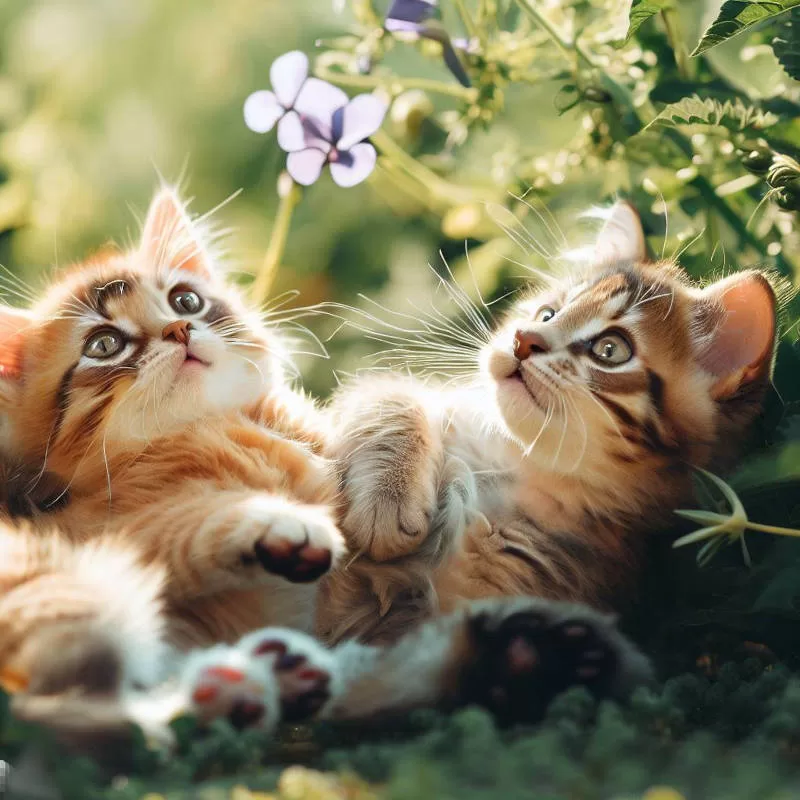
Topical Uses of Tea in Cats
Alternative to Oral Consumption
Topical application of medicinal teas for cats can be an excellent alternative to oral consumption. Why? Well, some cats may not like the taste or have difficulty ingesting teas. In these cases, the veterinarian may indicate topical application as a viable solution.
Benefits in External Treatment
Medicinal teas for cats have potential benefits in the external treatment of a number of conditions. If your feline has wounds or skin irritations, for example, a bath with a mild medicinal tea can help with healing and relieve itching. Chamomile is known for its calming and anti-inflammatory properties and can be a good option.
Care in Direct Application
However, it is important to be careful when applying anything directly to the cat’s skin or fur. Some points to consider include:
- Make sure the tea is cold before application.
- Avoid sensitive areas like eyes and mouth.
- Monitor your cat’s behavior after application to detect any adverse reactions.
Correct Dilution Before Application
Furthermore, respecting the specific indications regarding the correct dilution before application is crucial to ensure the safety of your pet. A very concentrated tea can do more harm than good.
For example, if you are using chamomile to treat skin irritations on your cat:
- Boil a cup of water.
- Add two tablespoons of dried chamomile flowers.
- Let it infuse for about 15 minutes.
- Strain the tea and let it cool completely before application.
Always remember: consult a veterinary professional before starting any type of herbal treatment on your cat! They can provide you with precise guidance on which herbs are safe to use and which dosage is appropriate for your pet’s size and condition.
In summary, the topical uses of medicinal teas can be a useful tool in the care of our feline friends – as long as they are used correctly!
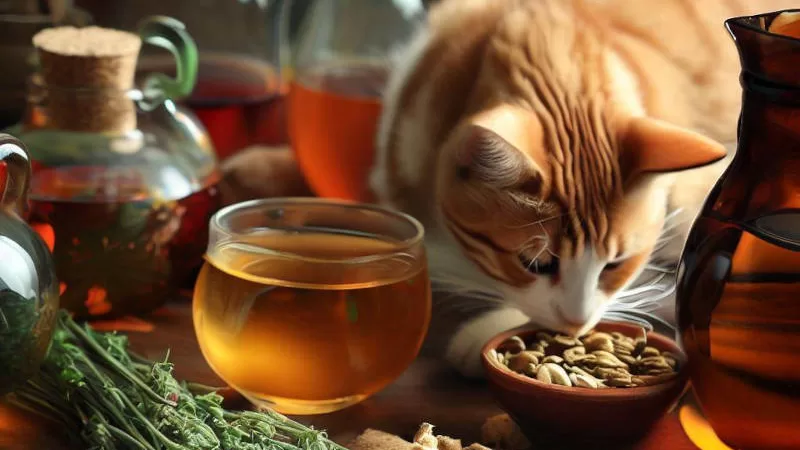
Conclusion on Medicinal Teas for Cats
So beauty? Now that you know a little more about medicinal teas for cats, it’s time to get your hands dirty. Or rather, in the weed! The benefits are many and surely your kitty will thank you. But remember: no exaggeration, okay? Each cat is unique and may react differently to herbs.
So, did you like the tips? How about starting to prepare some tea for your pet today? If you have any questions or want to share your experience with us, just send us a message. We are here to help you!
Common questions
What are the best medicinal teas for cats?
The best medicinal teas for cats vary depending on the animal’s need. However, chamomile and valerian are generally safe and beneficial.
Can I give any type of tea to my cat?
No. Some teas can be harmful to cats. It is always important to consult a veterinarian before introducing new foods to your pet’s diet.
How can I offer tea to my cat?
You can offer the tea to your cat by mixing it with their food or water, or administering it directly via an oral syringe.
Can the use of herbs replace traditional veterinary treatment?
No. Herbs can complement traditional veterinary care, but should not be used as a substitute without professional guidance.
Can my cat have allergic reactions to herbs?
Yes. Just like humans, cats can also have allergic reactions to herbs. Always watch your pet after introducing a new herb into its diet.
External Links:

